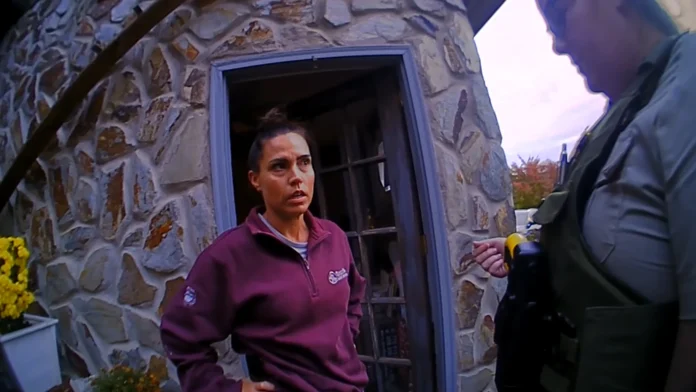It was the end of an unusual day for the four Patterson children when sheriff’s deputies showed up at their home near Blue Ridge, Georgia. The tidy split-level house, with chickens roaming the yard and yellow flowers lining the front steps, suddenly became the scene of a moment no one in the family would forget.
Deputy Kaylee Robertson knocked on the glass door, her green vest over her uniform and a tattoo of Blossom, the Powerpuff Girls leader, visible on her arm. The door opened, and Robertson greeted Brittany Patterson, a 41-year-old real estate agent.
“Brittany,” the deputy said, motioning with her hand, “I need you to come out here.”
Still on the phone, Brittany asked for a moment.
“No,” Robertson replied firmly. “Not ‘one second.’ I need you to come out here now.”
Brittany stepped outside into the cool autumn air, puzzled by the urgency.
“Okay,” Robertson said. “Turn around for me.”
“Why?” Brittany asked, her voice tinged with confusion.
“Because you’re under arrest,” Robertson said.
“For what?” Brittany asked, her tone soft but incredulous.
“For reckless endangerment,” Robertson said.
The charge, officially listed as misdemeanor reckless conduct, would soon spark national debate. People questioned whether it was fair to arrest a parent over a child’s actions, raising concerns about overreach and parental rights.
Earlier that day, Brittany’s 10-year-old son had walked down a local road, and someone reported seeing him alone. This prompted a 911 call, a police search, and eventually, Brittany’s arrest. But the story, as Brittany sees it, isn’t so simple.
Brittany and her family live in Appalachia, about 100 miles north of Atlanta. On that day, Brittany had left home to take her older son to a chiropractor in Ellijay. Her father, who lives in the basement, was the only other adult in the house. Brittany’s younger son, who is homeschooled, had been in his room moments earlier. When she called for him before leaving, he didn’t respond. Brittany figured he had gone to his favorite spot in the woods, something he often did when he wanted to be alone.
Unbeknownst to her, the boy had wandered about a mile away to Mineral Bluff. The route he took lacked sidewalks but had a dirt path behind a guardrail. He wasn’t hurt, but a passerby became concerned when they saw him walking alone and called 911.
Deputy Robertson found the boy on Railroad Avenue, sitting quietly in the back of her cruiser. Robertson called Brittany to ask about the situation. Brittany explained she hadn’t known where her son was but assumed he’d return home, as he’d done before.
The deputy seemed skeptical. “You didn’t think to call us?” Robertson asked.
“Well, no,” Brittany replied. “I wasn’t 100 percent sure he was missing.”
The deputies brought the boy home to his grandfather. Hours later, they returned to arrest Brittany, accusing her of reckless conduct for leaving the house while her son’s whereabouts were unknown.
Outside her home, handcuffed and bewildered, Brittany asked, “Is it illegal for a kid to walk to the store?”
“It is when they’re 10 years old,” Robertson said.
The case hinges on how one defines the word “missing” and whether Brittany’s decision not to call authorities constitutes a crime. Georgia’s reckless conduct law is vague and rarely applied in parenting cases. It states that someone is guilty if they “consciously disregard a substantial and unjustifiable risk” that could harm another person.
Legal experts have questioned the use of this law against Brittany. Her attorney, David DeLugas, called the charge a “misuse” of the statute and is pushing for her full exoneration.
The aftermath of the arrest has been challenging for Brittany. She spent about an hour in jail before being released on a bond. She now faces not only the legal battle but also the lingering implication that she’s a bad mother.
For Brittany, this accusation cuts deep. She has dedicated her life to her children, shuttling them to sports practices, school events, and family activities. Hearing her mother, who had been critical of her parenting in the past, defend her as “a good mother” on the body camera footage was a rare bright spot in an otherwise painful ordeal.
As for what’s next, it’s unclear. While the local prosecutor has indicated they don’t plan to pursue the case further, a proposal from child services suggested putting a location-tracking app on her son’s phone—something Brittany opposes.
Reflecting on the ordeal, Brittany is adamant about one thing: She is not a bad parent. “I’ve given my life to these kids,” she said. “And I’ll fight to prove it.”




























